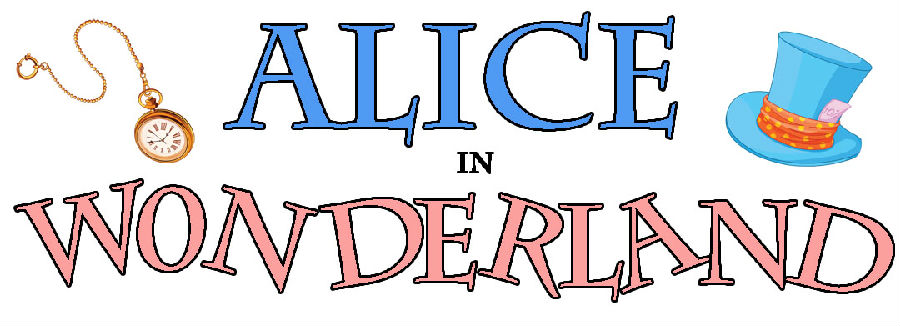(单词翻译:单击)
听力文本
Hello! From VOA Learning English, this is Words and Their Stories.
Many expressions that we use in American English come from movies and books. Today we will explore expressions from Lewis Carroll's famous book "Alice's Adventures in Wonderland." This book is better known as "Alice in Wonderland."
"Alice's Adventures in Wonderland" was published in 1865. The story is about a young girl falling, falling, falling ... for a long time down a rabbit hole. When she finally lands, she finds herself in a strange world.
In this strange world are some of the most recognizable characters in children's literature. Many of them, and other expressions from the book, have found their way into American English.

The first character Alice meets is the White Rabbit. The White Rabbit is not your usual rabbit. First of all, he is wearing a vest and carrying a pocket watch. He also has somewhere very important to be, he says over and over.
Running past Alice, he says, "I'm late! I'm late! For a very important date! No time to say hello goodbye, I'm late, I'm late, I'm late!"
Alice chases after him, and that is where her adventures begin.
In English, chasing a white rabbit means to chase the impossible, a fantasy, a dream. In 1967, the rock band Jefferson Airplane wrote a song called "White Rabbit." The song tells of Alice's adventures and hints that drugs are involved.
And if you go chasing rabbits
And you know you're going to fall
But don't worry. You need not take drugs. Following the white rabbit means following an unlikely clue and finding yourself in the middle of an extraordinary situation. This situation often challenges your beliefs and changes your life.
The White Rabbit is so curious, so strange, that Alice cannot help but to follow him. As she chases after him, she falls down the rabbit hole into Wonderland.
Like chasing a white rabbit, these days to go down the rabbit hole does not have to mean taking drugs to change your reality.
To fall down the rabbit hole can mean to enter a confusing situation.
However, usually we use this expression to mean we got interested in something to the point of distraction. We lose all track of time. It often happens by accident and is about something not that meaningful.
With this idiom, you can add details to further describe what type of rabbit hole you fell into, as in this example:
"Where have been? You were supposed to meet me here an hour ago."
"I am so sorry! I was looking online for some advice on how to get a baby to fall asleep and I fell into a rabbit hole of parenting blogs!"
"There are tens of thousands of those. It's a wonder you made your way out!"
Going down the rabbit hole can also mean a strange state of mind.
Later in the story, Alice is the guest at a tea party – a crazy tea party! There she meets the March Hare and the Hatter. They give her riddle after riddle. And both seem truly crazy.
As with many expressions found in Carroll's books mad as a March hare appeared in other places long before the publication of his book.
Hares have long been thought to behave excitedly in March, which is their mating season. Scientifically, this may not be true. But to be mad as a March hare means that someone is completely mad, or crazy.
The expression mad as a Hatter also means to be completely crazy. Of the two, mad as a Hatter is more common. But don't tell the March Hare. Who knows how he will react!
Now, we move on to the Cheshire Cat. Smiling like the Cheshire Cat was a common expression during Victorian times. Carroll brought this expression to life in his book with the character the Cheshire Cat. A person who is compared to the Cheshire Cat is sneaky, cunning, mischievous, unpredictable and mysterious.
Near the end of the story, Alice meets the Queen of Hearts.
The Queen of Hearts is a foul-tempered monarch. She is quick to give the death sentence for the slightest wrongdoing by yelling, "Off with their heads! Off with their heads!"
A woman who is called a Queen of Hearts is a control freak.
She is a self-appointed queen of events. And she is an aggressive woman who tries to dominate everything and everyone around her.
Using expressions from popular books can add a special flavor to your English. And when used properly, they also show you have a deeper understanding of the literature and culture of the English language. So, have fun with them!
And that's Words and Their Stories.
I'm Anna Matteo.
重点解析
1.children's literature 儿童文学
In the time of media culture, reading classic works of children's literature has a great significance.
在媒介文化的时代里,儿童文学经典作品的阅读具有极其重要的意义。
2.chases after 追逐,追赶
Or Chase after leaves That fall from the trees.
或者追逐那些从树上落下的树叶。
3.add ... to 加入,加到;增加
When it finds one, it will add a marker to the map.
当找到一个结果,程序就会将一个标记添加到地图里面。
4.self-appointed 自封的;自己作主的
First of all I have to self-examination, regardless of whether you are my self-appointed, or everyone, whether you default.
首先我要自我检讨,不管是我自封的也好,或者大家默认的也好。
参考译文
大家好!VOA学英语,这里是《词汇掌故》。
美语中的很多表达来自电影或者书籍。今天我们来探索来自刘易斯·卡罗尔著名作品《爱丽丝漫游奇境记》一书中的表达。这本书更广为人知的名字是《爱丽丝梦游仙境》。
《爱丽丝梦游仙境》于1865年出版。这个故事讲的是关于一个小女孩跌落,落,落······了很长时间,跌落进一个兔子洞的故事。当她终于落地了以后,她发现自己在一个怪异的世界里。
在这个奇异的世界里,有一些儿童文学中最熟悉的角色,其中许多角色和其他一些书中的表达出现在了美语中。
爱丽丝遇见的第一个角色是一只白兔,这可不是一只普通的白兔。首先,他穿着马甲,揣着一只怀表。他一遍又一遍地说着他要去一个重要的地方。
他从爱丽丝身边跑过,嘴里说着:“我迟到了!我迟到了!重要约会啊!没时间说你好再见了,我迟到了,我迟到了!”
爱丽丝便追赶他,这就是她冒险之旅的开始。
英语里,“chasing a white rabbit”意思是追寻不可能的事情,是幻想,梦想。1967年,摇滚乐队杰斐逊飞机写了一首《白兔》的歌。这首歌描述了爱丽丝的奇遇,同时也暗含毒品。
如果你去追寻兔子
你知道你会掉进洞中
但是不用担心,你不需要吸毒。“Following the white rabbit”意思是跟随不太可能的线索并发现自己身处难以置信的境况之中。这种境况一般会挑战你的信念或者改变你的生活。
这只白兔是如此令人好奇,太奇怪了,爱丽丝忍不住跟着他。由于她跟在兔子后面跑,她摔进了兔子洞从而进入了仙境。
就像“chasing a white rabbit”的表达,现如今“go down the rabbit hole”并不意味着吸毒能改变你的现实。
“To fall down the rabbit hole”可以指代进入了一个令人困惑的局面。
然而,我们经常用这个短语来表达我们对某物太感兴趣,以至于分心,浪费了大把时间,一般指对某事物突然感兴趣,而且是一些没有意义的事物。
对于这个习语,你可以增加一些进一步描述浪费你时间事物所属类型的细节,像这个例子这样:
“你去哪了?你一小时以前就该在这儿和我见面的。”
“真是太对不起啦!我在网上搜如何让婴儿入睡的一些建议,然后我花费了一堆时间在看育儿博客。”
“那有成千上万条,你能看完真是个奇迹啊!”
“Going down the rabbit hole”也可以指一种奇怪的精神状态。
后面的故事里,爱丽丝成为了一个茶会(一个疯狂的茶会)的客人!在那儿,她遇见了三月兔和帽匠,他们给她出了一个又一个谜语。他们俩看起来也很疯狂。
正如出自卡罗尔作品的其他表达一样,“mad as a March hare”这个表达在卡罗尔的作品出版之前早就出现在了其他地方。
人们一直认为野兔在三月会变得兴奋异常,因为三月是它们的交配季。从科学上来讲,这个观点也许不对,但“to be mad as a March hare”的是指某人彻底疯了。
短语“mad as a Hatter”的意思也是彻底疯了。这两个短语,“mad as a Hatter”更为常用。但是不要告诉三月兔,谁知道他会做什么!
现在,我们来聊下一个角色柴郡猫。“Smiling like the Cheshire Cat”是维多利亚时期一个通用表达。卡罗尔用书中柴郡猫这个角色将这个短语生动地表现了出来。被喻为“柴郡猫”的人,鬼鬼祟祟,狡猾,淘气,捉摸不透,神神秘秘。
接近故事尾声的时候,爱丽丝遇见了红桃皇后。
红桃皇后脾气暴躁,别人哪怕犯了小小的错误,她便立马叫喊着要判死刑,“砍掉他们的头!砍掉他们的头!”
一个被称作“红桃皇后”的女人是一个控制狂。
红桃皇后自诩为万事之主。她是一个霸道的女人,试图控制她周围的一切人和事。
使用来自受欢迎书籍里的表达能够对你的英语大有裨益。使用得当的话,它们也能彰显出你对英语文学和文化有了更深层次的理解。所以,享受这些短语带来的乐趣吧!
这就是今天的《词汇掌故》的了。
我是安娜·马特奥。


